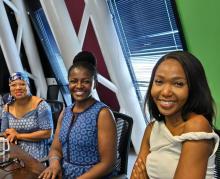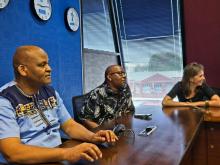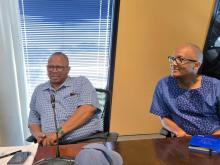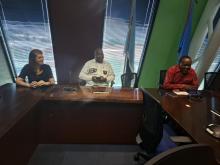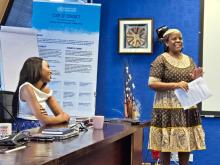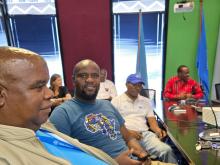Women rising: Progress, challenges & the road ahead – International Women’s Day 2025
International Women’s Day is an important occasion for reflecting on the progress made toward gender equality, celebrating the achievements of women, and recognizing the challenges that still remain. This year’s theme, "For All Women and Girls- Rights, Equality, Empowerment," serves as a reminder of both the strides women have made in various sectors and the barriers that persist. As Selelo aptly stated, "This day is not only a celebration of our achievements, but a reminder of the work still ahead of us to ensure true equality for all women and girls."
In her presentation, Lorina Selelo highlighted the vital role women play in shaping the workforce, often balancing multiple responsibilities that are not always recognized. As she put it, "Women are the backbone of many industries, yet their contributions often go unnoticed. It's time to acknowledge their impact and provide the support they need to thrive." Despite notable advancements in education and workforce participation, women continue to face significant hurdles, particularly in leadership, economic equality, and personal safety.
Selelo acknowledged the considerable progress women have made, particularly in the areas of political representation, education, and workforce participation. Since 1995, the number of women in national parliaments has more than doubled, and the number of female heads of state has quadrupled, signaling a shift toward greater female political empowerment. As Selelo remarked, "The rise in female political representation is proof that women are taking their rightful place at the decision-making table." In the realm of education, women’s literacy rates have improved drastically, with significant strides made in closing the gender gap in education. Despite equal access to education, however, women’s participation in the workforce has stagnated at 53%, far behind men's participation at 80%. This indicates that systemic barriers still hinder their full economic inclusion.
The rise of women in leadership roles was steady until 2016, but progress has since slowed, and current data shows a decline in female representation in top leadership positions. Selelo emphasized, "The climb to leadership is not easy, but it is essential. We must keep pushing for the doors of opportunity to remain open for women, not just to enter, but to thrive." However, there have been notable educational gains in regions such as Eastern and Southern Africa, where gender parity in primary education is nearly achieved, with 25 million more girls enrolled today than in the early 2000s.
Despite these advancements, significant challenges persist. Gender-based violence remains a global crisis, with a woman or girl being killed every 10 minutes by a partner or family member. This stark statistic underscores the urgent need for global action to protect women and girls. Selelo stated, "The fight against gender-based violence is far from over. We cannot rest until every woman and girl is safe from harm." In the economic sphere, women continue to outperform men academically, yet their representation in executive leadership positions remains low, pointing to persistent barriers preventing their advancement to top-tier roles.
Furthermore, no country has yet achieved full gender equality. At the current rate, it is projected that it will take 131 years to close the gender gap completely, highlighting the need for faster and more focused efforts. As Selelo concluded, "Time is of the essence. We must act now to ensure that the next generation of women does not have to wait 131 more years for the equality they deserve." While women tend to live longer than men, they spend more years in poor health, which reflects the ongoing need for health policies and services that specifically address the unique needs of women.





